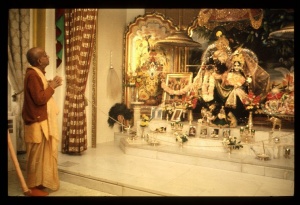CC Madhya 18.145 (1975): Difference between revisions
(Vanibot #0027: CCMirror - Mirror CC's 1996 edition to form a basis for 1975) |
(Vanibot #0020: VersionCompareLinker - added a link to the Version Compare feature) |
||
| Line 2: | Line 2: | ||
<div style="float:left">'''[[Sri Caitanya-caritamrta (1975)|Śrī Caitanya-caritāmṛta (1975)]] - [[CC Madhya (1975)|Madhya-līlā]] - [[CC Madhya 18 (1975)|Chapter 18: Lord Śrī Caitanya Mahāprabhu's Visit to Śrī Vṛndāvana]]'''</div> | <div style="float:left">'''[[Sri Caitanya-caritamrta (1975)|Śrī Caitanya-caritāmṛta (1975)]] - [[CC Madhya (1975)|Madhya-līlā]] - [[CC Madhya 18 (1975)|Chapter 18: Lord Śrī Caitanya Mahāprabhu's Visit to Śrī Vṛndāvana]]'''</div> | ||
<div style="float:right">[[File:Go-previous.png|link=CC Madhya 18.144 (1975)|Madhya-līlā 18.144]] '''[[CC Madhya 18.144 (1975)|Madhya-līlā 18.144]] - [[CC Madhya 18.146 (1975)|Madhya-līlā 18.146]]''' [[File:Go-next.png|link=CC Madhya 18.146 (1975)|Madhya-līlā 18.146]]</div> | <div style="float:right">[[File:Go-previous.png|link=CC Madhya 18.144 (1975)|Madhya-līlā 18.144]] '''[[CC Madhya 18.144 (1975)|Madhya-līlā 18.144]] - [[CC Madhya 18.146 (1975)|Madhya-līlā 18.146]]''' [[File:Go-next.png|link=CC Madhya 18.146 (1975)|Madhya-līlā 18.146]]</div> | ||
{{CompareVersions|CC|Madhya 18.145|CC 1975|CC 1996}} | |||
{{RandomImage}} | {{RandomImage}} | ||
==== TEXT 145 ==== | ==== TEXT 145 ==== | ||
| Line 25: | Line 24: | ||
<div class="translation"> | <div class="translation"> | ||
"It is now the beginning of the month of Māgha. If we go to Prayāga at this time, we shall have an opportunity to bathe for a few days during Makara-saṅkrānti." | |||
</div> | </div> | ||
| Line 32: | Line 31: | ||
<div class="purport"> | <div class="purport"> | ||
Bathing during the month of Māgha at | Bathing during the month of Māgha at Māgha-melā still takes place. This has been a very old melā (assembly) from time immemorial. It is said that the Lord in the form of Mohinī took a bucket of nectar and kept it at Prayāga. Consequently Māgha-melā has been observed, and there is an assembly of holy men there every year. Every twelfth year there is a Kumbha-melā, a great festival, and all the holy men from all over India assemble there. The brāhmaṇa wanted to take advantage of the Māgha-melā and bathe there. | ||
: | Bathing at the confluence of the Ganges and Yamunā near the fort at Allahabad, Prayāga, is mentioned in revealed scriptures: | ||
:māghe māsi gamiṣyanti | |||
:gaṅgā-yāmuna-saṅgamam | |||
:gavāṁ śata-sahasrasya | |||
:samyag dattaṁ ca yat-phalam | |||
:prayāge māgha-māse vai | |||
:tryahaṁ snātasya tat-phalam | |||
"If one goes to Prayāga and bathes at the confluence of the Ganges and Yamunā in the month of Māgha, he attains the result of giving hundreds and thousands of cows in charity. Simply by bathing for three days there, he attains the results of such a pious activity." Because of this, the Sanoḍiyā brāhmaṇa was very eager to go to Prayāga and bathe. Generally karmīs (fruitive laborers) take advantage of bathing there during the month of Māgha, thinking that they will be rewarded in the future. Those who are situated in devotional service do not very strictly follow this karma-kāṇḍīya process. | |||
</div> | </div> | ||
Latest revision as of 11:07, 27 January 2020

A.C. Bhaktivedanta Swami Prabhupada
TEXT 145
- māgha-māsa lāgila, ebe yadi yāiye
- makare prayāga-snāna kata dina pāiye
SYNONYMS
māgha-māsa lāgila—the month of Māgha has begun; ebe—now; yadi—if; yāiye—we go; makare—during the Makara-saṅkrānti; prayāga-snāna—bathing at Prayāga; kata dina—for a few days; pāiye—we shall get.
TRANSLATION
"It is now the beginning of the month of Māgha. If we go to Prayāga at this time, we shall have an opportunity to bathe for a few days during Makara-saṅkrānti."
PURPORT
Bathing during the month of Māgha at Māgha-melā still takes place. This has been a very old melā (assembly) from time immemorial. It is said that the Lord in the form of Mohinī took a bucket of nectar and kept it at Prayāga. Consequently Māgha-melā has been observed, and there is an assembly of holy men there every year. Every twelfth year there is a Kumbha-melā, a great festival, and all the holy men from all over India assemble there. The brāhmaṇa wanted to take advantage of the Māgha-melā and bathe there.
Bathing at the confluence of the Ganges and Yamunā near the fort at Allahabad, Prayāga, is mentioned in revealed scriptures:
- māghe māsi gamiṣyanti
- gaṅgā-yāmuna-saṅgamam
- gavāṁ śata-sahasrasya
- samyag dattaṁ ca yat-phalam
- prayāge māgha-māse vai
- tryahaṁ snātasya tat-phalam
"If one goes to Prayāga and bathes at the confluence of the Ganges and Yamunā in the month of Māgha, he attains the result of giving hundreds and thousands of cows in charity. Simply by bathing for three days there, he attains the results of such a pious activity." Because of this, the Sanoḍiyā brāhmaṇa was very eager to go to Prayāga and bathe. Generally karmīs (fruitive laborers) take advantage of bathing there during the month of Māgha, thinking that they will be rewarded in the future. Those who are situated in devotional service do not very strictly follow this karma-kāṇḍīya process.